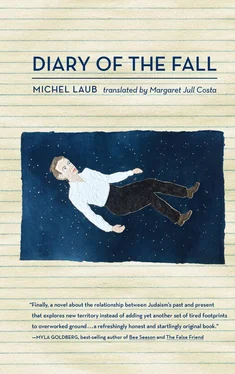20.
I never told João what happened to me after I saw him fall. Surely he must have thought about it. Did he, for example, imagine that I became his friend out of pity? Or out of guilt? Or because I was alone and no one else would speak to me after my conversation with the coordinator? Or for any one of those reasons that would justify the resentment that would perhaps have remained hidden had it not been for the new circumstances, the new school, the new classmates, the numerous friends he’d never had before and who allowed him to do something he had perhaps always wanted to do, a month after the start of term, two months, then three, and there comes a moment when João realizes that he doesn’t need me anymore, that I serve only as a reminder of the worst moment of his life, and he needs to move on from that memory and it’s then that he can do something he’s been planning for a long time, the one occasion on which he doesn’t bother to lie when his new classmates ask him about the previous year.
21.
I’m not sure whether it happened in March or in April or at the latest in May, João telling them about the birthday party, the one occasion on which he let it slip in the middle of the jokes they had got used to making about me, at least they would sound like jokes now, after all the years that have passed and all the times someone has looked at me and talked about money and about a conspiracy by the rats that have infested our houses ever since the Middle Ages and spread discord and hatred among decent people. I wasn’t there on the day, of course, and it wasn’t perhaps João’s deliberate intention, not directly anyway, but the fact is that it became public knowledge that I had allowed him to fall at his birthday party, my Jewish rat paws letting go of his head, my Jewish rat instinct fleeing in the ensuing confusion, my parasitic moneymaking cancerous Jewish rat nature betraying the rest of the gang in order to save myself and to continue sucking other people’s blood and health.
22.
The next day everyone at school knew about it, but this time I was prepared, as if anesthetized by what I’d experienced the previous year and which I would clearly go through again: the way people immediately changed the subject whenever I came into view, my name and the Star of David chalked on the wall in the corridor, and this time I myself would quickly rub it off so that no teacher would see it, so that the coordinator at the new school wouldn’t call me into her office and express her profound regret at that display of religious and cultural intolerance, and so that faced by the coordinator’s sympathy I wouldn’t again run the risk of feeling sick and vomiting up the names of the classmates I believed had done it, or even giving João’s name, because he must have known who was doing it, João who now only spoke to me in class or when we were alone together, where he wouldn’t have to demonstrate in public that he had been or still was my friend or feel obliged to invite me to some party at the weekend, and gradually I would cease to know anything about João’s life outside school, if he was still stealing tokens from public phone boxes, if he was still smoking hash and sniffing glue, if he had a girlfriend and was the first in the class to have one, and I started going straight from school to home and from home to school, cut off from João and all my other classmates and from any other possibility apart from studying and my bedroom and my life, which didn’t change throughout the eternity of every day, every hour of eighth grade.
A FEW MORE THINGS I KNOW ABOUT MY FATHER
1.
Of the six hundred and fifty Jews sent to Auschwitz along with Primo Levi, six hundred and thirty-eight died within the first year. Of the twelve who survived, Primo Levi was the only one to write a book, If This Is a Man . Unlike my grandfather, he was concerned with recording every detail of the camp routine, from his arrival in 1944 to his liberation by the Red Army when the war ended.
2.
Before If This Is a Man , no one knew about the card placed beside a tap just inside Auschwitz, warning inmates not to drink from it because the water was dirty. The rules also forbade sleeping in your jacket or without your underpants, or leaving the hut with your collar turned up or not taking a shower on the prescribed days.
3.
Fingernails needed to be trimmed regularly, but that could only be done with your teeth. With toenails, the friction of the shoes was enough. The shoes were distributed in a completely arbitrary fashion, and each prisoner had only a few seconds in which to choose, from a distance, a pair that appeared to be the right size, for there could be no changing them later, and according to Primo Levi, this was the first important decision to be made, because a shoe that is too tight or too loose causes blisters that burst and in turn cause infections that make the feet swell and stop you walking or running, and the rubbing of the swollen foot against the wood and cloth of the shoes causes more blisters and more infections that end up taking the prisoner to the hospital with a diagnosis of swollen feet, a complaint for which there is no cure in Auschwitz.
4.
Primo Levi says that in Auschwitz death begins with the shoes, and I wonder if he was referring only to his time in the camp or to the decades that passed after putting on the pair he managed to grab during those five decisive seconds. Primo Levi died when he was sixty-eight, in Turin, Italy, having written thirteen books, many of them about the Holocaust and many of which had been translated into various languages, and having resumed his career as a chemist, and married and had children and received prizes and become a literary celebrity in Europe and the world, and I wonder: was he thinking about that choice of shoe, too large or too small, or perhaps, with rare and enviable luck among the million and a half prisoners who passed through the camp, a shoe that was just the right size, was he thinking about that when he opened the door of his apartment, walked over to the stairs and fell down the stairwell, an occurrence that almost none of his biographers believes to have been accidental.
5.
Death begins in many ways, and I don’t know if my grandfather ever managed to pinpoint the seed, the crucial moment when it ceased to matter that he had survived Auschwitz who knows how, and left there in who knows what state, and recovered in Poland or in Germany or who knows where, and managed to get himself on a boat heading for Brazil after overcoming who knows what difficulties, because from that moment on it was pretty clear that he would spend the rest of his life much as Primo Levi did. The only difference is that, instead of leading an apparently normal family life and decades later throwing himself down a stairwell, he led an apparently normal family life and decades later began writing those notebooks.
6.
Milk — a liquid food with a creamy texture, which as well as containing calcium and other substances essential to the organism has the advantage of not being highly susceptible to the development of bacteria. Milk is the perfect source of nourishment to be taken by a man when he is about to spend the morning alone .
7.
I saw a film once in which the son goes into his father’s office and discovers that all the drawers are filled with loose cigarettes arranged in neat rows, this happens the day after his father has had a nervous breakdown in the shower and smashed the glass door, and I wonder if something similar occurred with my father when he read the first page or the first line of those sixteen notebooks.
Читать дальше












